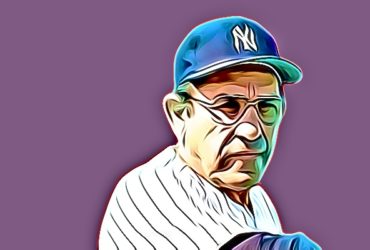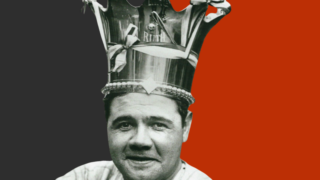Are some people magic? It’s hard to believe that it’s possible, but if anyone ever was it’s Lawrence Peter Berra.
You know him as Yogi — the world knows him as Yogi — and he’s been charmed his entire life. However, despite the obvious fact that Yogi had fortune shining on him, the owner of the New York Yankees exiled him from the team in the 1980s and it took a bit of groveling to get Berra back in the fold. When that apology arrived, Berra showed again that he was blessed with luck that could benefit the Yankees.
According to Yogi, he didn’t want to manage the Yankees in 1985, but he was willing to take on the job again for the team he loved under one condition — that team owner George Steinbrenner wouldn’t fire him during the season. Steinbrenner agreed, and the 59-year old Berra took his team into the season, a team expected to be pretty good in a tough AL East division. But rumblings started early after the Yanks lost three games to the Red Sox to open the season. But a four-game winning streak immediately after that sweep righted the ship a little for Berra and the Bombers. But the Steinbrenner’s leash for Berra was short and his trigger finger was itchy. A week and a half later, with the Yankees in Chicago, Stienbrenner made his decision: he would replace Yogi with Billy Martin, his go-to manager-in-waiting, the guy he’d fired three times previously, and the guy who Yogi had replaced 16 months earlier. General manager Clyde King was dispatched to the Windy City to deliver the bad news to Berra, who took it in stride, at least publicly.
“I had an inkling, so if it happened now or later, what’s the difference?” Berra said.
But in his heart, Berra felt betrayed. He knew Martin was still on George’s payroll and he also knew that Lou Piniella was in the wings being groomed as the Yankee Manager of the Future. He realized his job was probably his last in the dugout, but he didn’t want to be given a partial season and he didn’t want to be embarrassed. Being axed just 16 games into the season was not what the Yankee legend deserved, not after he’d been an organization man for so many years.
Yogi Berra signed his first contract at the age of 17, the Yankees giving him $500. Following a stint in rookie ball, Berra spent two years in the U.S. Navy in World War II, serving as a gunner’s mate on a ship during the D-Day invasion. His charmed luck was handy in the war and he returned to the States to play ball in 1946, and the following season he was sharing time behind the plate at Yankee Stadium. The team won the pennant and the World Series in his first season. It was just the beginning — the Yanks won 14 pennants in the 17 seasons where Berra was in the regular lineup. Yogi earned 10 World Series rings, and he wasn’t just a lucky charm, he won three Most Valuable Player awards and was the best catcher in the league.
The Yankees recognized Berra’s value and hired him to manage the team in 1964 after his playing career was ending. What happened? Berra guided the team to a pennant, though they lost in the World Series. Apparently that was not acceptable, and Yogi was fired by CBS, the conglomerate that owned the franchise. For the next decade and more, Berra was employed by the crosstown Mets (he led them to a pennant in ’73), before coming back to the Yanks in 1976, ironically as a coach under Martin, who was in his first stint under Steinbrenner. With Yogi back in the right pinstriped uniform, the Yankees won three straight pennants and two World Series titles. In 1981 the Yanks won another pennant with Berra on the coaching staff. By this time he had too many rings and not nearly enough fingers. In his 25 seasons with the Yanks at the big league level as a player, coach, or manager, Berra had won 19 pennants and 12 World Series titles. The little man was the Yoda of the Yankee Jedi dynasty.
Then Berra succeeded Martin for the ’84 season and guided them to 87 wins. But the “poor start” in ’85 cost him and when the impetuous Steinbrenner broke his word, Berra walked away from the Yankees. 14 years would pass before he would even set foot in Yankee Stadium again. In 1988 the Yankees installed monuments honoring Berra and the Hall of Fame catcher who preceded him, Bill Dickey. But Yogi didn’t attend. Even after Steinbrenner was banned from baseball and surrogates took over the Yankees, Berra stayed away. When the Yankees broke their drought and went back to the postseason in 1995 and went to the World Series the next year, Berra wasn’t there to throw out a first pitch under the spotlights in the Fall Classic. No man had ever played as many games in the World Series, and all of them came with the Yankees, but even when Joe DiMaggio, Mickey Mantle, and Whitey Ford came back for the big moments and the annual old timers game, Yogi refused to budge. “Not as long as George is there,” he told confidants.
But prior to the 1999 season, Steinbrenner finally swallowed his pride and made a personal visit to Yogi at his home in New Jersey. The two men met for several hours and George apologized for the way he had handled the firing in ’85. Berra came back to the Yankee family, and in spring training he was in uniform working with Yankees’ catchers.
On July 18, 1999, Berra returned to Yankee Stadium for “Yogi Berra Day” surrounded by many of his former teammates. It was an official reconciliation between Yogi and the franchise that he loved. Former teammate Don Larsen threw the first pitch to Berra in front of a packed crowd at the ballpark. Incredibly, in a scene that couldn’t have been dreamed up by Hollywood, Yogi’s special “luck” was working overtime that day: Yankee pitcher David Cone threw a perfect game, just the 16th in baseball history. Was it magic? No, it was just another chapter in the charmed life of Yogi Berra, who returned to Yankee Stadium in grand fashion after a 14-year exile. Oh, and in the first three seasons of Yogi’s return to the Yankees, the team won the pennant each year.




